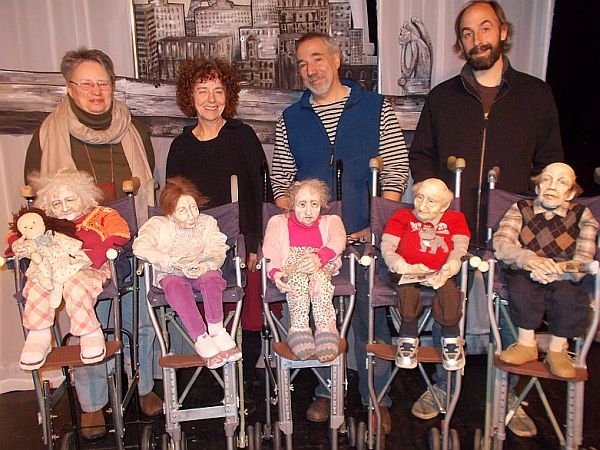
Putney’s Sandglass Theatre is known internationally for using puppets together with human actors to address weighty themes.
The company’s newest production explores the inner lives of five elderly puppets with late-stage dementia.
The play also explores the power of imagination, and the possibility of connection after reason and memory are gone.
The show is titled "D-Generation: an Exaltation of Larks." It’s set in a nursing home.
It opens with Mary, a sweet-faced puppet with a cloud of white hair. She’s sitting in a wheelchair, clutching a baby doll. We hear the voice of an unseen visitor, her son, as Mary might hear it in a matrix of indecipherable noise:
"Hi Mom, how are you today? How do you feel? Did you have a good day? How was your breakfast, what did you eat for breakfast?"
As the questions continue Mary becomes agitated and begins to sob.
"Mom what’s the matter?" her son asks. "Stop, what are you doing? Did I say something wrong?"
Sandglass co founder and artistic director Eric Bass says people with Alzheimer’s and dementia are often asked questions they can’t answer — questions that require memory or a certain logic, Bass says, that the person just can’t access anymore.
"And so they feel really defeated," Bass says.
"D-generation" portrays a different approach, and it’s one that’s based on actual experience with Alzheimer’s patients.
In 2008, a non profit group for long-term care workers asked Sandglass to create a show about a program called Time Slips. The program uses storytelling and photographs to spark the imaginations of people who’ve lost most of their mental powers.
Bass and his wife, Sandglass co-founder Ines Zeller Bass, trained in the technique, along with others in the troupe. They led two series of story circles with residents in Brattleboro nursing homes.
Much of the show is taken verbatim from those sessions.
The Time Slips sessions start with everyone onstage. The craggy-faced puppets in their wheelchairs are in high spirits: Mary, Florence. Rose Elwood, and Henry. The men laugh as the caretakers explain what’s about to happen.
"Good morning, Elwood," says one. "I’m Eric, I’m the activities director. We’re going to create some stories today."
Elwood asks, as he always does, "How do you know my name?"
Eric and Ines-Zeller Bass work the puppets in plain sight, along with Sandglass puppeteer Kirk Murphy. They use rods to make the puppets move, and skills known only to themselves to coax emotions from their painted-on faces. The puppeteers also play the caretakers at the home.
The session is one of two the show portrays. It starts with a black and white photo: a couple dressed in evening clothes, dancing on the roof of a skyscraper.
"What shall we say is happening in this picture?" Kirk asks them.
"He’s going to kidnap her!" says Elwood.
Kirk tries again: "Florence, what would you like to say is happening in this picture?"
Rose pipes up, "They are dancing on the roof!"
"They’re on the railroad tracks!" Elwood says.
"Oh look at her shoe up in the air!" Florence adds. "The music is coming from the building behind them"
Henry starts singing, "I’ll be seeing you in all the old familiar places…" and soon the whole group is singing.
"Can I have it quiet, please?" Rose interjects.
Eric Bass says the story sessions ignite a creative spark in people who can’t communicate in other ways.
"It puts them in a social situation," Bass adds, "So that they are collaborating, talking to, playing with, laughing with other people in the care facility with them."
As the story telling continues the puppets suggest bits of their old identities. Rose, who is whiney and difficult, tells about wanting to be a dancer.
Florence, with some prompting, says the couple in the photo are going to Paris, to shop.
"For a tux and something bright and different," Florence tells them. "And then they’ll have cocktails."
"He is a dance teacher!" Rose insists.
Florence continues. "She works in a bakery and he came in and ordered a croissant."
Then Elwood: "Want a donut, honey?"
But whatever the characters inadvertently reveal, the key to this program’s success is that it’s not about the past or about who these people used to be. It’s about being in the moment with the people they are now.
Puppeteer Kirk Murphy says the troupe had an advantage. They came in as artists, unencumbered by shared memories — although a number of troupe members have experienced Alzheimer’s in their own families.
"Not being caregivers and not being family members," Murphy says, "We were able to go into these circles of people and just engage with the, with zero attachment to their identity, with zero attachment to their past."
The players say the Time Slips technique also opens up alternatives for relatives longing for any kind of contact.
It fosters what Ines Zeller Bass calls ‘little moments of reprieve’ when the clouds part and a bit of light, and even joy, cut through the pain of this incurable disease.
Sandglass Theatre’s performances are on March 22nd and 23rd at Brattleboro’s New England Youth Theatre.
http://www.sandglasstheater.org/calendar/touring.html
For more about Time Slips: http://www.timeslips.org/